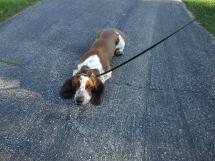By Leslie Lindsay
Growing up, I think Dr. Jessica and I could have been fast friends…if we pulled ourselves out of our shells long enough to actually talk. As a self-proclaimed shy nerdy girl, Jessica Vogelsang loved books and dogs and had very little interest in what was fashionable: Velcro tennis shoes and denim jean jackets bedazzled with puffy paint.
ALL DOGS GO TO KEVIN is a beautiful legacy to her gifts: storytelling, caring demeanor toward animals, and her practical approach to veterinary science. I laughed, I cried, I nodded my head knowingly as I read through each story, from Dr. V’s early “nerd days” to vet school, first clients, early motherhood, and beyond.
Yes, there are sad parts of the story, and that’s simply because dogs don’t have life spans near as long as humans, but there’s always, always something they can teach about our lives. In the end, it’s the dogs that make us better humans.
Dr. Vogelsang is the founder of the website Pawcurious.com, and her writing has been featured on Yahoo! and CNN, as in Ladies Home Journal, People, Outside magazine, and USA Today.
Today I am thrilled to have Dr. V. on the blog couch. Along with her golden retriever, of course.
Leslie Lindsay: Thanks so much for being with us today, Jessica! I finished the book last night with a basset puppy on my chest. I’m working now so she can sleep (ha!), so we’re a bit on borrowed time. Tell me how you came to the idea of writing ALL DOGS GO TO KEVIN, was it dogs and your experience as a vet, or was it Kevin who inspired you? A little of both?
Dr. Jessica Vogelsang: I grew up on James Herriot, so writing a book was always something I had wanted to do. But in a circuitous way Kevin also played a role in it. He pushed me to start a blog in 2009, and although I wasn’t into that idea I did think writing a blog would be ok. He’s also the one who came up with the name pawcurious, which I thought was a terrible name. Glad I trusted him!
L.L.: I love at the end of ALL DOGS GO TO KEVIN you talk about how Kevin was very much “like a dog in human’s clothing—full of love, brimming with life, and gone all too soon.” What words might you share with someone who is grieving the loss of a pet?
Dr. Jessica Vogelsang: I think it’s important for them to know it’s ok. It’s so normal, and we are so abnormal as a society in the way we expect people to be ashamed of their grief. I would encourage them to talk about their pet and their grief, and if they aren’t surrounded by supportive people, to find some online.
L.L.: And now you are providing in-home hospice care for dog and cats. What a smart, touching way to use your gifts Can you tell me more about that, please? 
Dr. Jessica Vogelsang: I sort of fell into hospice when I was writing the book. When Kekoa needed to be euthanized, I called on a friend to come to the house. She asked me a little while later if I might be interested in working with her practice, and I thought I might be willing to give it a try although the idea weirded me out a little. Now that I’ve been doing it for several years I can’t imagine doing any other kind of work in the field!
“Veterinarian Vogelsang pays tribute to the dogs that have played important roles in her life and professional practice . . . She writes movingly . . . A feel-good, bittersweet memoir…”
—Kirkus Reviews
L.L.: My 8-year old has wanted to be a vet since she could say, “doggy doctor.” I know getting into vet school is not exactly easy. What advice might you give to those who want to pursue a career in veterinary medicine?
Dr. Jessica Vogelsang: Go into it with a full understanding of the emotional toll it may take on you. Students these days are graduating with an unprecedented amount of debt and an insecure job market. I don’t say that to discourage people from the field, but I would make sure they understand the financial implications. There are so many ways to work with animals- you don’t have to limit yourself to a DVM!
L.L.: Can you talk a little about your journey to becoming a published author? How might it compare to vet school?
They are very different and yet very much the same for me, in terms of me doing it the wrong way. When you write a book, the traditional path is write the book, find an agent, find a publisher. I did it in the exact reverse order.
I was very fortunate to have an extremely hands on agent in Steve Troha, who helped me formulate my idea for the book. My editor Emily Griffin at Grand Central was such a supportive champion for the book. I have no idea how I would have gotten it done without them! It truly was a team effort. Sort of like vet school in that regard too- you are responsible for your own outcome, but the support of your colleagues is what keeps you afloat.
L.L.: I’ve been enamored with the low-slung, comically defined basset hound for years. Can you tell us any funny basset hound stories?
Dr. Jessica Vogelsang: You know, I really didn’t see too many of them where I lived and worked! They are not a hugely popular dog in San Diego. On the rare occasion we did get one in we would take bets on what it was in for: ears or skin issues. Usually it was both.
L.L.: What is obsessing you now and why?
Dr. Jessica Vogelsang: Catching up on my reading! I took such a long break while I was writing the book. I am reacquainting myself with the works of Stephen King and having a grand time doing so. I really feel like reading a ton is the best way to get better at writing so I can excuse this effort as work-related.
I’m also obsessed with pop science and the influence of pseudoscience celebrities on the web. It’s a fascinating study of confirmation bias and how people choose what to believe and why. As someone who tries to be a science educator of sorts, at least in terms of animal health, it’s really important to understand why people just refuse to believe things you take for granted (like the importance of vaccines, for example.)
L.L.: What might I have forgotten to ask about that I should have?
Dr. Jessica Vogelsang: What’s the next book! And the answer is I don’t know. I have two ideas in mind I need to mull on. Stay tuned.
L.L.: Thanks so much for such a fabulously fun and touching read. I’m recommending all vets-to-be, vets, and dog lovers read ALL DOGS GO TO KEVIN!
Dr. Jessica Vogelsang: Thank you so much!
For more information, or to follow, please visit Pawcurious:
 Dr. Jessica Vogelsang is a veterinarian, mother, and big-time dog person. She worked in emergency and small animal medicine before settling into her current practice in San Diego providing in-home hospice care for dogs and cats. She is the founder of the website www.pawcurious.com. Visit Jessica at www.drjessicavogelsang.com. Her writing has been featured in or on Yahoo!, CNN,Ladies’ Home Journal, People Pets, Outside magazine, and USA Today.
Dr. Jessica Vogelsang is a veterinarian, mother, and big-time dog person. She worked in emergency and small animal medicine before settling into her current practice in San Diego providing in-home hospice care for dogs and cats. She is the founder of the website www.pawcurious.com. Visit Jessica at www.drjessicavogelsang.com. Her writing has been featured in or on Yahoo!, CNN,Ladies’ Home Journal, People Pets, Outside magazine, and USA Today.
[Cover image courtesy of Grand Central Publishing. Author photo credit: Paul Barnett]



